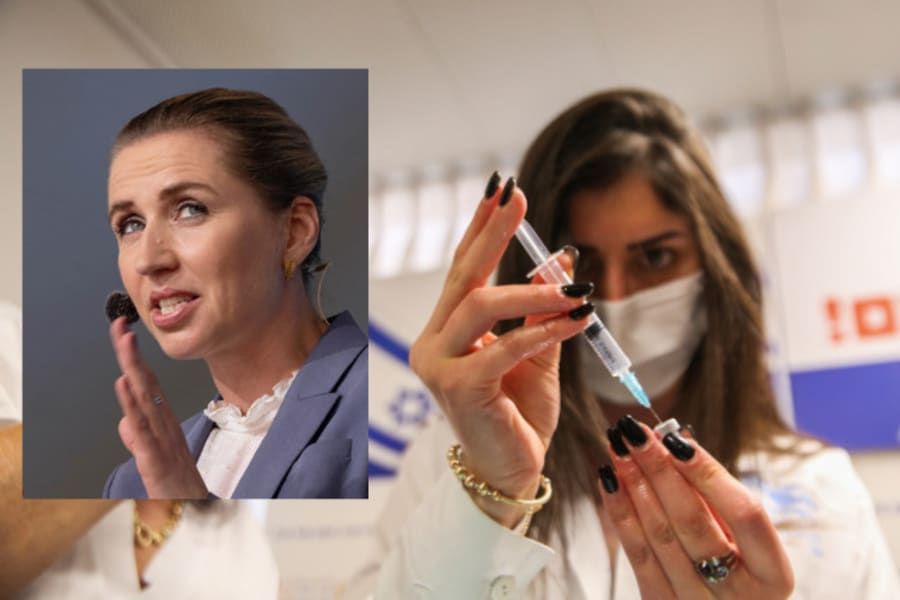Danish PM’s visit to Israel criticized amid European division on 'vaccine passports'
Critics argue that her visit legitimizes Israel’s “vaccination apartheid” against Arabs

Danish Prime Minister Mette Frederiksen is facing criticism at home for her scheduled visit to Israel on Thursday.
Frederiksen will arrive in Jerusalem alongside Austrian Chancellor Sebastian Kurz with the goal of strengthening vaccine cooperation with the Israeli government. While the Danish prime minister has praised Israel’s successful vaccination program, left-wing critics in Denmark argue that her visit legitimizes Israel’s “vaccination apartheid” against Palestinians in the West Bank and Gaza Strip.
Referring to the Geneva Convention, left-wing critics in Denmark and other European countries claim that as an “occupying power,” Israel has a legal obligation to provide vaccinations to the Palestinian population. Critics in Denmark have blasted Frederiksen’s intention to buy surplus vaccines from Israel, arguing that it constitutes a lack of solidarity with the Palestinian population.
However, European critics of Israel ignore the real issue which is not “apartheid,” but citizenship. The Palestinian Authority and Hamas are in charge of their own people and their local vaccination efforts in the West Bank and Gaza. Regardless of their religious and ethnic background, all Israeli citizens are eligible to be vaccinated including Arab citizens and residents of the Jewish state. In addition, Israel recently made a commitment to vaccinate approximately 120,000 Palestinians who work legally in Israel.
Frederiksen defended her visit to Israel while avoiding the charges of “vaccine apartheid.”
“The main focus is that Kurz [Austrian chancellor] and I seek to establish a long-term plan with Israel to increase the production capacity [of vaccines], but I do not expect to return home with suitcases filled with vaccines. My task is to bring vaccines to Denmark,” Frederiksen said.
The growing Danish-Israeli vaccine cooperation transcends politics. In a recent interview with Danish newspaper Børsen, Israeli ambassador to Denmark, Benny Dagan, described Kare Schultz, Danish CEO of Teva Pharmaceuticals, the Israeli pharmaceutical giant, as a “very important player” in the burgeoning Danish-Israeli vaccine alliance. In a February interview with Bloomberg, Schultz said that the Israeli pharmaceutical company had offered to co-produce COVID-19 vaccines for the world market.
The vaccine-focused visit of the Danish and Austrian leaders to Israel can also be attributed to frustration with the European Union’s slow vaccination rollout and the need for alternative solutions. According to recent statistics, only 7.5% of the European population has received one COVID-19 dose, compared with 52% in Israel.
While Israel has already launched its controversial “green passport” for fully vaccinated citizens, the idea of a vaccine passport is dividing the EU’s 27 member states. At one end of the spectrum, Austria and Greece – two countries with close ties to the Netanyahu government – are pushing other states to adopt “vaccination passports” in an effort to revive Europe’s ailing tourism industry. Like Israel, Greece already provides digital vaccination certificates, a move that is being considered in Denmark and Sweden.
However, large and influential European countries, such as Germany and France, are far less enthusiastic. Critics in Berlin, Paris and elsewhere argue that vaccination certificates are premature due to the unknown longer-term efficiency of the vaccine, especially towards the more severe virus variants from Britain, Brazil and South Africa.
As in Israel, there is also public concern that vaccination certificates may lead to discrimination towards unvaccinated citizens who could face numerous restrictions in their daily lives. Various protests and petitions have been raised against vaccine passports and COVID-19 restrictions throughout an increasingly divided EU which was founded on the principles of unity and cooperation.

The All Israel News Staff is a team of journalists in Israel.













